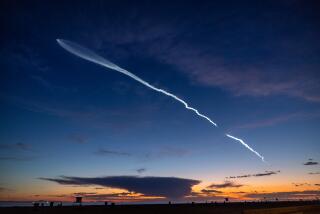Boeing sues Russian, Ukrainian partners for $355 million
Boeing Co. sued its former partners in the rocket venture Sea Launch, which has major operations in Long Beach, for more than $355 million.
The aerospace giant filed the lawsuit in Los Angeles federal court Friday. Just one day earlier, Sea Launch failed to lift a Boeing-made satellite into orbit and it plunged into the ocean.
In the suit, Boeing claimed that Rocket & Space Corp. Energia, a firm owned in part by the Russian government, and KB Yuzhnoye and PO Yuzhnoye Mashinostroitelny Zavod, two Ukrainian rocket companies, have failed to pay back loans.
The companies were once partners in Sea Launch, a unique satellite launch provider that blasts off rockets from a floating platform in the Pacific Ocean.
Boeing said that it provided funding for Sea Launch, which went into Chapter 11 bankruptcy protection in 2009, with the understanding it would be paid back. The Chicago company said it has not yet received the money, and called its lawsuit “a straightforward breach of contract case.”
“Instead of paying claims to which they have no defense on the merits, Yuzhnoye and Energia have decided to stall and evade, forcing [Boeing] to chase them around the world to secure payment of debts clearly owed,” the lawsuit said.
Sea Launch was formed as a joint venture in 1995 and was seen by Boeing as an alternative to launching its satellites from land, many of them built in El Segundo. Under the initial plan, the aerospace giant held a 40% stake, with the remaining shares held by RSC Energia, a Norwegian shipbuilder and the two Ukrainian rocket firms.
All told, the consortium poured about $1 billion into the project, most of it to build the ship and a floating platform, made from a modified oil rig.
The company’s rocket, the Zenit-3SL, is largely made in Ukraine and shipped to the Port of Long Beach. That’s where Sea Launch docks its specially designed ship and the launch platform.
The vessels head to an isolated spot about 3,300 miles southwest of Long Beach and 1,400 miles south of the Hawaiian Islands to launch. The site allows the rockets to reach orbit faster while burning less fuel as they use the Earth’s rotation for momentum.
But just as the venture was launching its first rockets in 1999, demand for satellites fell when the dot-com bubble began to burst. By 2002, Sea Launch had sent up only one satellite.
The company was able to stay afloat, counting DirecTV Inc. and satellite services provider Intelsat as customers. But it gained worldwide notoriety in 2007 after dramatic video images of a failed launch went viral on the Internet.
Launch cancellations mounted and in 2009, the company filed for bankruptcy protection after it could not pay a $52-million judgment it lost in connection with a terminated launch contract.
While in bankruptcy protection, the banks that financed Sea Launch asked for loan guarantees. Boeing said it guaranteed nearly $450 million.
In late 2010, an affiliate of Russian aerospace giant RSC Energia announced it would invest $155 million for a 95% stake in the company, which helped boost it out of Chapter 11 bankruptcy protection. The remaining 5% is split between Boeing and the Norwegian shipbuilder.
Under new owners, Sea Launch moved headquarters from Long Beach to Bern, Switzerland. But it continues to operate its equipment in Long Beach.
Boeing said it is owed $222 million by Energia, $133 million by Yuzhnoye, plus interest, and attorney fees.
ALSO:
Boeing asks FAA for OK to begin 787 Dreamliner test flights
British troops use mini-drones to find targets on the battlefield
Daredevil went faster than previously thought during 24-mile fall







